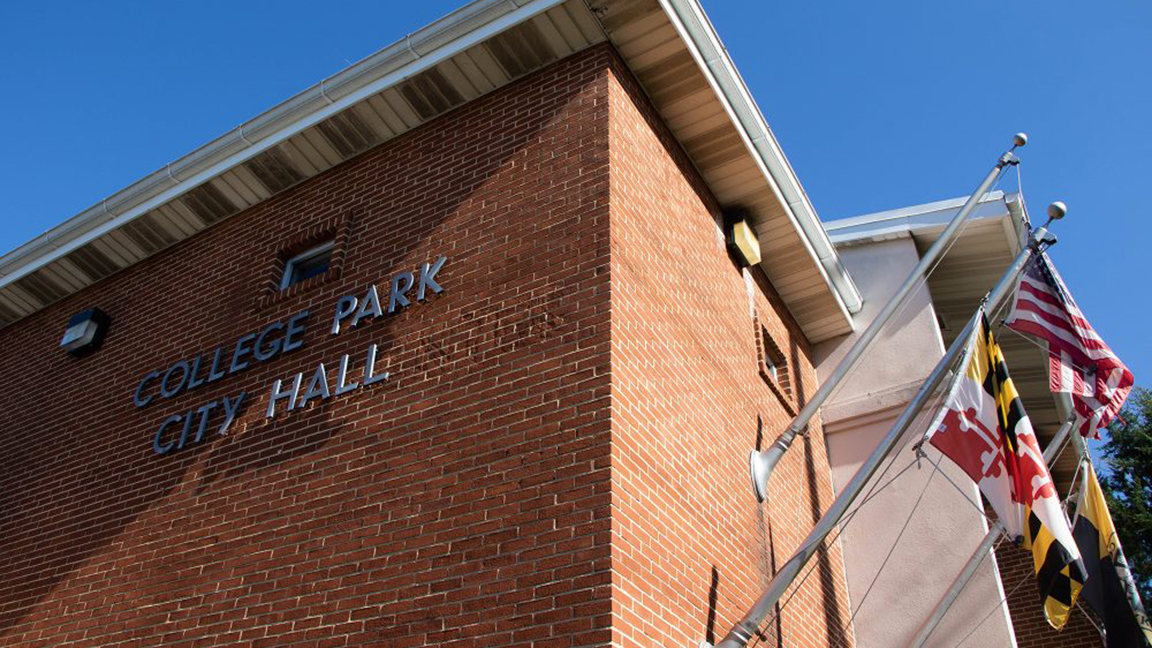Tensions ran high during a work session Tuesday night as the College Park City Council discussed making a recommendation to the Prince George’s County Council in favor of a school facilities surcharge waiver for The Hub, a student housing project set to replace two duplexes that have resided on Knox Road for over 50 years.
The preliminary and detailed site plans for the complex, set to be constructed across from Terrapin Row, were approved by the county planning board in October. The project’s developer is seeking an exemption from the county’s school facilities surcharge — a fee enacted by the county to cover expected increases in public education services that would come with the new residents.
Inside the Capital Beltway, the surcharge for a project is $9,770 per unit, though certain kinds of housing can be exempted from the surcharge.
The Maryland General Assembly changed the process of implementing a surcharge exemption for undergraduate student housing in 2019, making it so the city of College Park can recommend that the county exempt undergraduate student housing built west of Route 1, north of Knox Road and south of Metzerott Road from the surcharge.
Since the change, the city has recommended a partial waiver for one student housing complex — Tempo — and a full waiver for a student housing and retail project from Greystar.
[College Park City Council considers renting office space for city’s Seniors Program staff]
City council members delved into the financial nuances of school facilities surcharges on Tuesday, as Matt Tedesco, attorney for the developer, urged the council to recommend a waiver for the surcharge.
Tedesco referenced the two previous waivers the council had recommended, arguing that The Hub would be at a competitive disadvantage without an exemption from the surcharge, which would come out to about $1.2 million total. Because the project’s plans have already been approved, the developer would not be able to offset the seven-figure fee through construction or engineering, Tedesco said.
“That money will have to come out of the project somewhere else and … it’ll come out of the back end with respect to the rents,” he said. “We will have no choice but to have to increase the rents, which I don’t think anybody really wants.”
But some council members weren’t keen on the idea of waiving the surcharge. District 3 council member John Rigg argued against the surcharge waiver, voicing concern about raising the rent, a common worry with new developments in the city.
Rigg pointed out that, in past discussions, Tedesco had said rent rates would be set by the market. Now, Rigg said, Tedesco was going against that by arguing that rent would have to be increased without a school facilities surcharge waiver.
“I’m not quite sure markets in a competitive … environment really work that way,” Rigg said. “You take the price that’s set by the market … You don’t say, ‘I’m going to set it higher because I have some additional [fee.]’”
Adam Rosenbaum, city council student liaison, was also disappointed by Tedesco’s argument about increasing rent, saying that it seemed like Tedesco was backtracking on statements about market-set prices.
“It sounds like the for profit company really does have all the power necessary to overcome market forces and set rent to overcharge students as they please,” Rosenbaum wrote in a message after the work session.
[College Park Council unanimously approves parking restrictions on Beechwood Road]
Tedesco also pointed out that the surcharge would not be guaranteed to directly benefit the city of College Park — instead the money would go into a county fund that can only be used for renovations to buildings or debt service on bonds issued for new construction. And, he argued, the county tax revenue from the development, roughly $800,000 annually, would be a bigger benefit to educational services in the long run than the surcharge.
“The one-time fees pales in comparison to the actual tax revenue that these projects generate,” he said.
Rigg, however, said that even though the city may not directly get the benefit of the surcharge, the county’s school system — where many schools are overcrowded and at least 10 have been shuttered due to unsafe conditions — would.
“It continues to strike me as a somewhat misaimed policy to ask a city government to opine and make a recommendation on the waiver,” he said.
District 1 council member Kate Kennedy agreed with Rigg’s discomfort with the council being put in this situation. But she felt a recommendation for a partial waiver could be the best course of action, which would put more of the decision into the county’s hands.
District 4 council member Maria Mackie said she also struggled with the issue. She gets what Tedesco was saying, she said, but she also understands the need for more schools in the county. It’s a tough decision, she said, but she agreed with the idea of a partial waiver.
Fellow District 4 council member Denise Mitchell shared Mackie’s stance.
“It does put us in a predicament,” Mitchell said.



